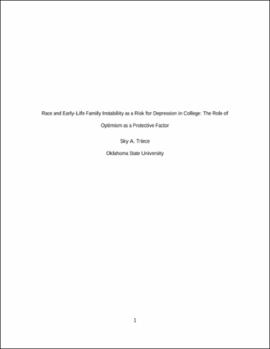| dc.description.abstract | Family instability, conceptualized as abrupt, involuntary, and/or negative change in family circumstances, has broad implications for children's long-term health (Sandstorm, 2013). Growing evidence suggests that family instability during childhood is associated with maladjustment in adulthood, including depression (Craigie, Brooks-Gunn, & Waldfogel 2012). Optimism, defined as a dispositional tendency to hold favorable expectations about the future, has been associated with psychological well-being and the use of adaptive coping strategies in the face of adversity. Additionally, optimism may be especially protective for youth who face structural barriers to success, including barriers related to socioeconomics, race/ethnicity (Meece & Kurtz-Costes, 2001). Undergraduate students (N=698) were recruited through the online research system at Oklahoma State University completed an anonymous survey that assessed family instability (ACE-SF; Felitti et al., 1998), levels of optimism (LOT-R; Carver, 2013), and depressive symptoms (PHQ-9; Spitzer, Williams, and Kroenke, 1999). The findings suggest that early-life family instability may increase the risk for depressive symptoms in the transition to adulthood. However, high levels of optimism were found to be protective against depression generally, with no differences found between racial groups. Findings have implications for identifying students who are at risk for depression due to experiences of family instability during childhood and providing them with support or interventions aimed to increase optimism (Meevissen, Peters, & Alberts, 2011). | |
